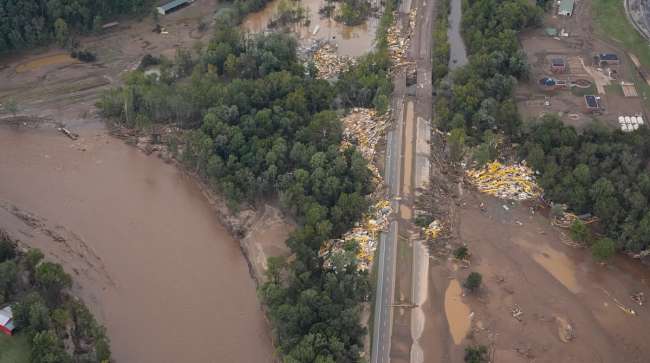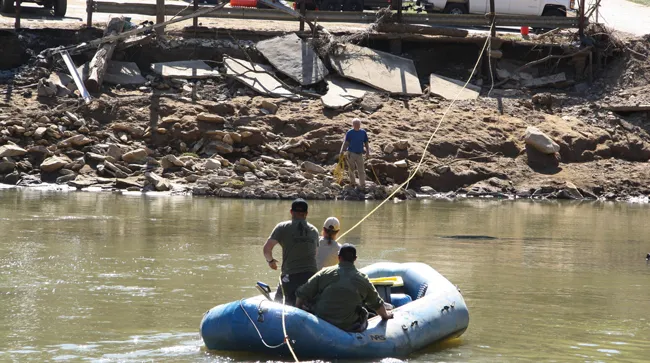Staff Reporter
FHWA Releases $134M for Hurricane Helene Road Repairs

[Stay on top of transportation news: Get TTNews in your inbox.]
The Federal Highway Administration authorized $134 million in quick-release emergency funds to state transportation departments in North Carolina, South Carolina and Tennessee to restore infrastructure damaged by Hurricane Helene just days before Hurricane Milton threatened to inflict similar damage across Florida.
Authorized by Congress, these Highway Trust Fund-sourced grants will help states repair or rebuild federal-aid highways and roads on federal lands damaged by natural disasters or catastrophic failures. The emergency funding aims to expedite recovery in the three affected states, which are grappling with widespread destruction left by Hurricane Helene. The storm claimed more than 200 lives and ravaged infrastructure across the region.
“It has been devastating to witness scenes of the North Carolina families, neighbors and communities destroyed by Helene explain what it means to have access to significant aid relief slowed or even cut off,” said Kristin White, acting FHWA administrator.
North Carolina, still reeling from extensive damage after Hurricane Helene struck the Gulf Coast on Sept. 26 and moved over the South, is among the worst-hit areas. The state is receiving the largest grant of $100 million in FHWA Emergency Relief Program funds.

Connecticut Army National Guard members, accompanied by civilian volunteers, deliver supplies to Burnsville, N.C., residents on Oct. 8. (Makiya Seminera/Associated Press)
The storm slammed into the state, bringing heavy rain, flooding and tornadoes. It caused catastrophic damage to infrastructure, including several areas of Interstate 40. The North Carolina Department of Transportation has 2,100 employees and 1,100 pieces of equipment working to reopen 4,700 damaged road sites.
Major disaster declarations were issued in 27 counties in North Carolina. As of Oct. 9, about 3,000 soldiers and airmen were working in the western part of the state, which suffered the most damage. The number of displaced residents in temporary hotel shelters with federal assistance rose to 2,600. Nearly 10 million liters of water and 7.7 million meals have been delivered for relief responders and affected residents.
Tennessee will receive the second-highest FHWA grant of $32 million. Damage to many roads and bridges has made travel hazardous throughout the state.

(Jeff Roberson/Associated Press)
Aftermath of Helene
As of Oct. 8, about 600 Tennessee National Guardsmen and first responders, using helicopters and 150 vehicles and construction equipment, have removed 420 truckloads of debris and rescued 100 people. Nearly 400 emergency personnel have been transporting 125,000 pounds of drinking water, food, medicine, electricity generators and other necessities to stranded residents. Engineers have begun rebuilding roads in Greene County.
“As recovery operations continue, this emergency transportation funding will help Tennessee address immediate needs on the path to recovery, and more support will be available as further requests come in,” U.S. Transportation Secretary Pete Buttigieg said.
The hurricane inflicted substantial damage in eight Tennessee counties, including washed-out roads and bridges needing to be entirely replaced or repaired. The quick-release federal funds will enable faster repairs to a closed section of I-40 and I-26 near the Tennessee-North Carolina state line to restore essential traffic there and on other critical state routes.
The third batch of emergency FHWA funds will provide the South Carolina DOT with $2 million to pay for infrastructure repairs, especially in 12 counties that sustained substantial damage to bridges, culverts and roads. The federal dollars will help state officials reopen and maintain U.S. Route 276 in Greenville County. SCDOT has begun picking up debris, removing trees, reopening roadways and supporting utility crew operations.
Travel conditions have been so bad in mountainous areas of North Carolina and Tennessee that volunteer mule trains have been the only way to deliver vital necessities to isolated communities.
Want more news? Listen to today's daily briefing below or go here for more info:




